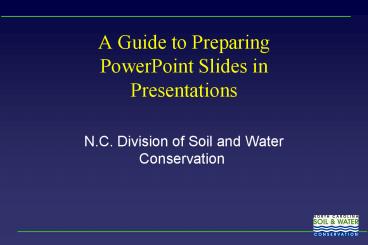A Guide to Preparing PowerPoint Slides in Presentations - PowerPoint PPT Presentation
1 / 26
Title:
A Guide to Preparing PowerPoint Slides in Presentations
Description:
PowerPoint Slides in Presentations. N.C. Division of Soil and Water Conservation ... Funny thing, though: it's the people in the audience who get to decide what ... – PowerPoint PPT presentation
Number of Views:481
Avg rating:3.0/5.0
Title: A Guide to Preparing PowerPoint Slides in Presentations
1
A Guide to PreparingPowerPoint Slides in
Presentations
- N.C. Division of Soil and Water Conservation
2
Your Slides Are Not Your Presentation
- Slides focus your presentation
- They emphasize what you think is important
- Slides can keep you on track
3
Slides Can Be
- Visual cues
- Mnemonic devices
- Communication shortcuts
4
Slides Can Be
- Images worth 1,000 words
5
Outlined Structures are Easierto Follow
- Draft an outline first
- Then decide what slides youll need
- Guidelines for Presentations
- Content
- Design
- Delivery
6
No More than One Topicper Slide
- One topic
- The same topic
- And ONLY that topic!
7
Fatal Flaw 1 Too Much Text
- When you put text on the slide, its an implied
invitation to read it. If youve included so
much text your audience cant comprehend it at a
glance, then youre already headed in the wrong
direction because youve lost their attention,
and whatever you say while theyre reading is
largely ignored. Dont believe me? Then what
did I just say? - Of course, some might just decide to ignore your
slides, which means your slides are pointless.
Dont waste their time and yours. If the
information is that crucial, give it to them in
handouts. But then dont read the handout to
them! Do that and youre right back to wasting
time. Oh yes, and distribute handouts before the
presentation. - Start by asking yourself, What three things will
I just hate myself for if I let these people
leave the room without knowing? Much more
content than that and the audience starts losing
whats important. Unless, of course, youre one
of those people who thinks everything you have to
say is of dire importance. Funny thing, though
its the people in the audience who get to decide
what theyll pay attention to and what theyll
tune out. Help them make that decision by
limiting thecontent of your slides individually
and your presentation overall.
8
Use the 6 X 6 rule
- No line more than six words.
- No
- slide
- more
- than
- six lines.
9
Avoid Unnecessary Wording
- Avoid unessential words and punctuation like
a, an, the, to, for, and, by - Avoid a, an, the, to, for, and, by
- Its amazing how much our minds will grasp
with the right clues
10
Phaomnneil pweor ofthe hmuan mnid
- Aoccdrnig to a rscheearch at Cmabrigde
Uinervtisy, it deosn't mttaer in waht oredr the
Itteers in a wrod are, the olny iprmoetnt tihng
is taht the frist and Isat Itteer be at the rghit
pclae. The rset can be a total mses and you can
sitll raed it wouthit porbelm. Tihs is bcuseae
the huamn mnid deos not raed ervey Iteter by
istlef, but the wrod as a wlohe.
11
Select Readable Type Size(Minimum 36 point for
Titles)
- 24 to 32 point for text body
- Limit to three type sizes per presentation
- Proportion type size accordingly
45 point 40 point 35 point 30 point 25 point 20
point 15 point 10 point
12
Typeface Selection Use Serif Fonts for Titles
Garamond Courier Times New Roman
13
Typeface Selection
- Use sans serif for text body
- Arial
- Lucida Console
- Impact
14
Use Bullets, Not Numbers
- Bullets imply no significant order
- Use numbers to show rank or sequence
15
Format Text for Emphasis
- Emphasize with size
- Then try font or style changes
- Finally, use color
16
Adjust text for emphasis
- Whatever you emphasize, changeonly one design
element per slide.
17
Choose Color Carefully
- Use light letters on dark backgrounds
- Use the same colors consistently
- Avoid primary colors in proximity
18
Charts GraphsUse Solid Colors, Not Patterns
- Pattern fills on graphs cause confusion
- 3-D effects defeat comprehension
19
Use Simple Tables to Present Numbers
Try not to make footnotes too small
20
Forget Stock Clipart
- It rarely communicates anything.
- Art should add meaning to your presentation.
21
Search Images on Google.com or Dogpile.com
22
Allow plenty of room around borders and
illustrations
My little dream house
23
You talkin' to me?
- Oral presentation is about speaking and
listening - Speak to your audience, not your slide
- Make eye contact
- Connect
24
Your Audience Gives You Clues
- Confusion
- Questions
- Boredom
25
Slides Dont Prove Competence
- PowerPoint slides arent evidence you know
your work. - Work on communicating what you know, not on
making slides. - What will your audience remember when they
leave the room?
26
End on a Question
- Conscientious presenters want to hearwhat their
audience doesnt know - Questions?































